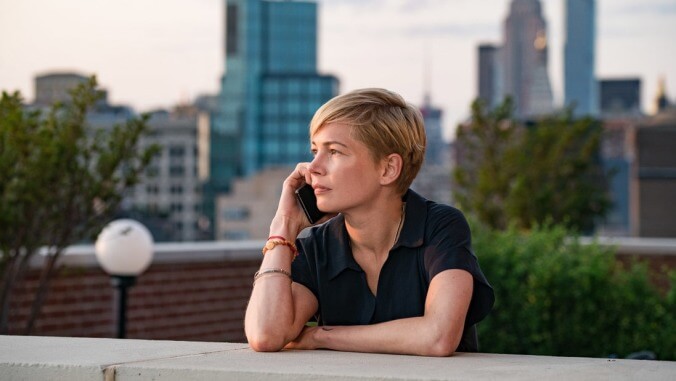Photo: Sony Pictures Classics
Though technically a film, with all of its corresponding qualities, After The Wedding primarily exists as an actor’s showcase for its main quartet. Director Bart Freundlich creates a space for his players—Michelle Williams, his wife, Julianne Moore, Billy Crudup, and relative newcomer Abby Quinn—to exhibit their skills in scenes specifically designed to spotlight their craft. Each of them receives a handful of close-ups, with many, if not most, lit to catch tears brimming in their eyes. They are all provided opportunities to run the gamut of legible, actorly emotion: weep, yell impassioned dialogue, and contemplatively stare, either off into the middle distance or at a transparently symbolic object (in this case, it’s a bird’s nest). Sometimes the four actors make subtle choices with line deliveries or facial expressions, intermittently imbuing their respective characters with fleeting spontaneity. In the not-so-distant future, After The Wedding will likely be used as a teaching tool by low-rent acting classes across the nation.
Given that Freundlich has access to a genuinely talented ensemble, and that his visual style mostly consists of drone shots that he employs with the errant giddiness of a child testing a new toy, it’s not the worst move to get out of the performers’ way. Unfortunately, After The Wedding saddles its cast with a hackneyed script calibrated for high melodrama, only to punt in favor of cheap sentimentality. When Isabel (Williams) travels to New York to meet with wealthy benefactor Theresa Young (Moore) so she can potentially fund her Kolkata orphanage, she’s unexpectedly invited to the wedding of Theresa’s daughter, Grace (Quinn). There, she spots Theresa’s husband, Oscar (Crudup), with whom she shares a complicated history, stretching back some 20 years. It shouldn’t be a spoiler to disclose that long-buried secrets are inevitably dredged up and consequences rear their ugly heads.
A remake of Susanne Bier’s 2006 film of the same name, After The Wedding remains faithful to the plot of the Danish original, so the particulars of the twists, such as they are, can be easily researched. Freundlich’s main edit amounts to swapping the characters’ genders so that the film’s focus shifts towards the women, but no reorientation can overwrite a script so hell-bent on diverting attention away from anything remotely interesting. After The Wedding initially flirts with standard class conflict—Williams: the distrustful liberal activist; Moore: the rich corporate maven who holds the purse strings; Crudup: the class traitor—but mostly dances around it until it’s time for the heartfelt speeches. Character motivations are opaque, the better to artificially set up the forthright emotion that arrives later on. Repressed desires are telegraphed so strongly they might as well be subtitled, e.g. Moore’s character jamming out to Lady Gaga’s “Edge Of Glory,” the meaning of which soon becomes thuddingly obvious. Generally speaking, Freundlich approaches subtext with the grace of a clumsy, Clouseau-esque waiter.
The actors’ admirable commitment to the film’s emotional reality, regardless of its manipulative nature, does goes a long way. (Most notably, Crudup sells the eye-rolling origin of his daughter’s name with nothing more than a slight crack in his voice.) Nevertheless, After The Wedding feels handcrafted for maximum passive enjoyment, as if the bar to clear was “watchable.” Freundlich’s fetishistic interest in both rural Indian villages and lush mansion interiors gives the game away: Keep the eye occupied by any means necessary in between scenes of Oscar-nominees performing capital-D Drama. Blandly inoffensive, After The Wedding will certainly appeal to those who want films to simply lay their cards out on the table. Just don’t ask for anything more of it.


 Keep scrolling for more great stories from The A.V. Club.
Keep scrolling for more great stories from The A.V. Club.